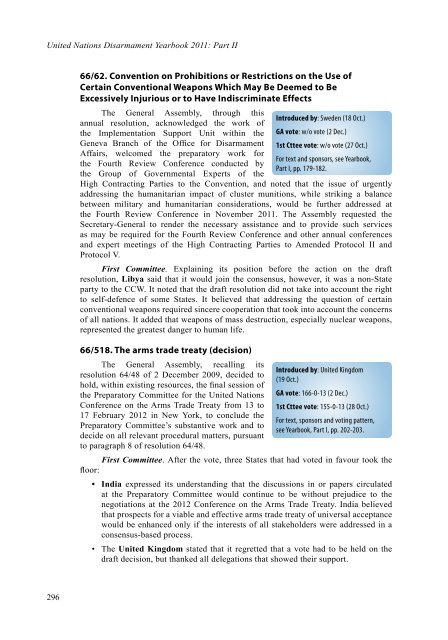DYB2011-Part-II-web
DYB2011-Part-II-web
DYB2011-Part-II-web
You also want an ePaper? Increase the reach of your titles
YUMPU automatically turns print PDFs into web optimized ePapers that Google loves.
United Nations Disarmament Yearbook 2011: <strong>Part</strong> <strong>II</strong><br />
296<br />
66/62. Convention on Prohibitions or Restrictions on the Use of<br />
Certain Conventional Weapons Which May Be Deemed to Be<br />
Excessively Injurious or to Have Indiscriminate Effects<br />
The General Assembly, through this<br />
annual resolution, acknowledged the work of<br />
the Implementation Support Unit within the<br />
Geneva Branch of the Office for Disarmament<br />
Affairs, welcomed the preparatory work for<br />
the Fourth Review Conference conducted by<br />
the Group of Governmental Experts of the<br />
High Contracting <strong>Part</strong>ies to the Convention, and noted that the issue of urgently<br />
addressing the humanitarian impact of cluster munitions, while striking a balance<br />
between military and humanitarian considerations, would be further addressed at<br />
the Fourth Review Conference in November 2011. The Assembly requested the<br />
Secretary-General to render the necessary assistance and to provide such services<br />
as may be required for the Fourth Review Conference and other annual conferences<br />
and expert meetings of the High Contracting <strong>Part</strong>ies to Amended Protocol <strong>II</strong> and<br />
Protocol V.<br />
First Committee. Explaining its position before the action on the draft<br />
resolution, Libya said that it would join the consensus, however, it was a non-State<br />
party to the CCW. It noted that the draft resolution did not take into account the right<br />
to self-defence of some States. It believed that addressing the question of certain<br />
conventional weapons required sincere cooperation that took into account the concerns<br />
of all nations. It added that weapons of mass destruction, especially nuclear weapons,<br />
represented the greatest danger to human life.<br />
66/518. The arms trade treaty (decision)<br />
The General Assembly, recalling its<br />
resolution 64/48 of 2 December 2009, decided to<br />
hold, within existing resources, the final session of<br />
the Preparatory Committee for the United Nations<br />
Conference on the Arms Trade Treaty from 13 to<br />
17 February 2012 in New York, to conclude the<br />
Preparatory Committee’s substantive work and to<br />
decide on all relevant procedural matters, pursuant<br />
to paragraph 8 of resolution 64/48.<br />
Introduced by: Sweden (18 Oct.)<br />
GA vote: w/o vote (2 Dec.)<br />
1st Cttee vote: w/o vote (27 Oct.)<br />
For text and sponsors, see Yearbook,<br />
<strong>Part</strong> I, pp. 179-182.<br />
Introduced by: United Kingdom<br />
(19 Oct.)<br />
GA vote: 166-0-13 (2 Dec.)<br />
1st Cttee vote: 155-0-13 (28 Oct.)<br />
For text, sponsors and voting pattern,<br />
see Yearbook, <strong>Part</strong> I, pp. 202-203.<br />
First Committee. After the vote, three States that had voted in favour took the<br />
floor:<br />
• India expressed its understanding that the discussions in or papers circulated<br />
at the Preparatory Committee would continue to be without prejudice to the<br />
negotiations at the 2012 Conference on the Arms Trade Treaty. India believed<br />
that prospects for a viable and effective arms trade treaty of universal acceptance<br />
would be enhanced only if the interests of all stakeholders were addressed in a<br />
consensus-based process.<br />
• The United Kingdom stated that it regretted that a vote had to be held on the<br />
draft decision, but thanked all delegations that showed their support.


